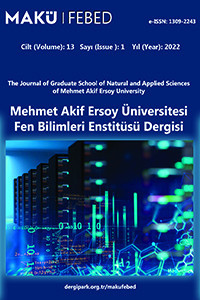Ilgın (Tamarix parviflora) Hemiselülozlarının Oktanoil, Dekanoil ve Lauroil Klorür ile Esterlenmesi
Ilgın (Tamarix parviflora), hemiselülozların esterlenmesi, sübstitüsyon derecesi, yüzde verim
Esterification of Smallflower Tamarisk (Tamarix parviflora) Hemicelluloses using Octanoyl, Decanoyl and Lauroyl Chloride
Smallflower tamarisk (Tamarix parviflora), esterification of hemicelluloses, degree of substitution, percentage of yield,
___
- Cooper, P., Balantinecz, J. (1999). Agricultural waste materials for composites: A Canadian reality. Centre for Management Technology Global Panel Based Conference, Nikko Hotel, Kuala Lumpur, 18-19 October.
- Dill, I., Salnikow, J., Kraepelin, G. (1984). Hydroxyproline-Rich Protein Material in Wood And Lignin of Fagus Sylvatica. Applied and Environmental Microbiology. 48(6), 1259–1261.
- Fang, J.M., Sun, R., Fowler, P., Tomkinson, J., Hill, C.A.S. (1999). Esterification of Wheat Straw Hemicelluloses in the N,N-Dimethylformamide/Lithium Chloride Homogeneous System. Journal of Applied Polymer Science, 74, 2301–2311.MEB-MEGEP. (2007). Bahçecilik, Süs Ağaççıkları, Ankara. Önal, E. (2007). Farklı Biyokütlelerin ve Bunların Sentetik Polimerlerle Birlikte Pirolizi, Elde Edilen Ürün Özelliklerinin Belirlenmesi. Anadolu Üniversitesi, Fen Bilimleri Enstitüsü, Doktora Tezi, Eskişehir.
- Ren, J., Xu, F., Sun, R.C., Peng, B., Sun, J. (2008). Studies of the Lauroylation of Wheat Straw Hemicelluloses under Heating. Journal of Agricultural and Food Chemistry, 56, 1251–1258.
- Sun, R.C., Fang, J.M., Tomkinson, J., Hill, C.A.S. (1999). Esterification of Hemicelluloses from Poplar Chips in Homogenous Solution of N,N-Dimethylformamide/Lithium Chloride. Journal Of Wood Chemistry and Technology, 19(4), 287-306.
- Sun, R.C., Fang, J.M., Tomkinson, J. (2000). Characterization and Esterification of Hemicelluloses from Rye Straw. Journal Agricultural Food Chemistry, 48, 1247-1252.
- Sun, R.C., Fang, J.M., Tomkinson, J., Liu, J.C., Geng, Z.C. (2001). Fractional Isolation, Physico-Chemical Characterization and Homogeneous Esterification of Hemicelluloses from Fast-Growing Poplar Wood. Carbohydrate Polymers, 44, 29–39.
- Sun, X.F., Sun, R.C., Sun, J.X. (2004). Oleoylation of Sugarcane Bagasse Hemicelluloses using N-Bromosuccinimide as a Catalyst. Journal of The Science of Food and Agriculture, 84, 800-810.
- Tanrıverdi, H. (2011). Haşhaş Sapı (Papaver somniferum L.) Hemiselülozlarının N,N-Dimetilformamit/Lityum Klorür Homojen Sisteminde Esterifikasyonu. Süleyman Demirel Üniversitesi, Fen Bilimleri Enstitüsü, Doktora Tezi, Isparta.
- Wise, E.L., Karl, H.L. (1962). Celluloese and Hemicellulose in Pulp and Paper Science and Technology. Libby, C.E. (Ed.), Vol:1, Mc Graw Hill Book Co., New York.
- Xu, F., Jiang, J.X., Sun, R.C., She, D., Peng, B., Sun, J.X., Kennedy, J.F. (2008). Rapid Esterification of Wheat Straw Hemicelluloses Induced by Microwave Irradiation. Carbohydrate Polymers, 73 (4), 612-620.
- Yaşar, S., Güller, B., Baydar, H. (2010). Susam (Sesamum indicum L.), Pamuk (Gossypium hirsitum L.) ve Haşhaş (Papaver somniferum L.) Saplarında Karbonhidrat, Lignin Miktarları ve Bazı Lif Özellikleri Üzerine Araştırmalar. SDÜ Orman Fakültesi Dergisi 1, 56-66.
- Yuan T., Sun, S., Xu, F., Sun, R. (2011). Homogeneous Butyrylation and Lauroylation of Poplar Wood in the Ionic Liquid 1-Butyl-3-Methylimidazolium Chloride. Bioresource Technology, 102, 4590–4593.
- Yayın Aralığı: Yılda 2 Sayı
- Başlangıç: 2010
- Yayıncı: Burdur Mehmet Akif Ersoy Üniversitesi
Görüntü Analizi Yöntemlerinin Geoteknik Mühendisliğinde Kullanımı
Tarihi Binalarda Yangına Karşı Korunma ve Mevzuatın İrdelenmesi
Ilgın (Tamarix parviflora) Hemiselülozlarının Oktanoil, Dekanoil ve Lauroil Klorür ile Esterlenmesi
Mehmet Rafet KISTIR, Duygu KURTOĞLU
Üç Farklı Kızılçam Populasyonu Fidanlarının Morfolojik Özellikleri
Halil Barış ÖZEL, Cengiz YÜCEDAĞ, Volkan AYDINHAN
İbrahim İskender SOYASLAN, Kerem HEPDENİZ
Karacaören I Baraj Gölünün Kuş Faunası
Halil SUEL, İdris OĞURLU, Emrah Tagi ERTUĞRUL
Kayaağıl (Uşak) Termal Sularının Hidrojeoloji ve Hidrojeokimyasal İncelemesi
Blokzinciri Teknolojisi ve Yakın Gelecekteki Uygulama Alanları
